How Many People in Germany Speak English?
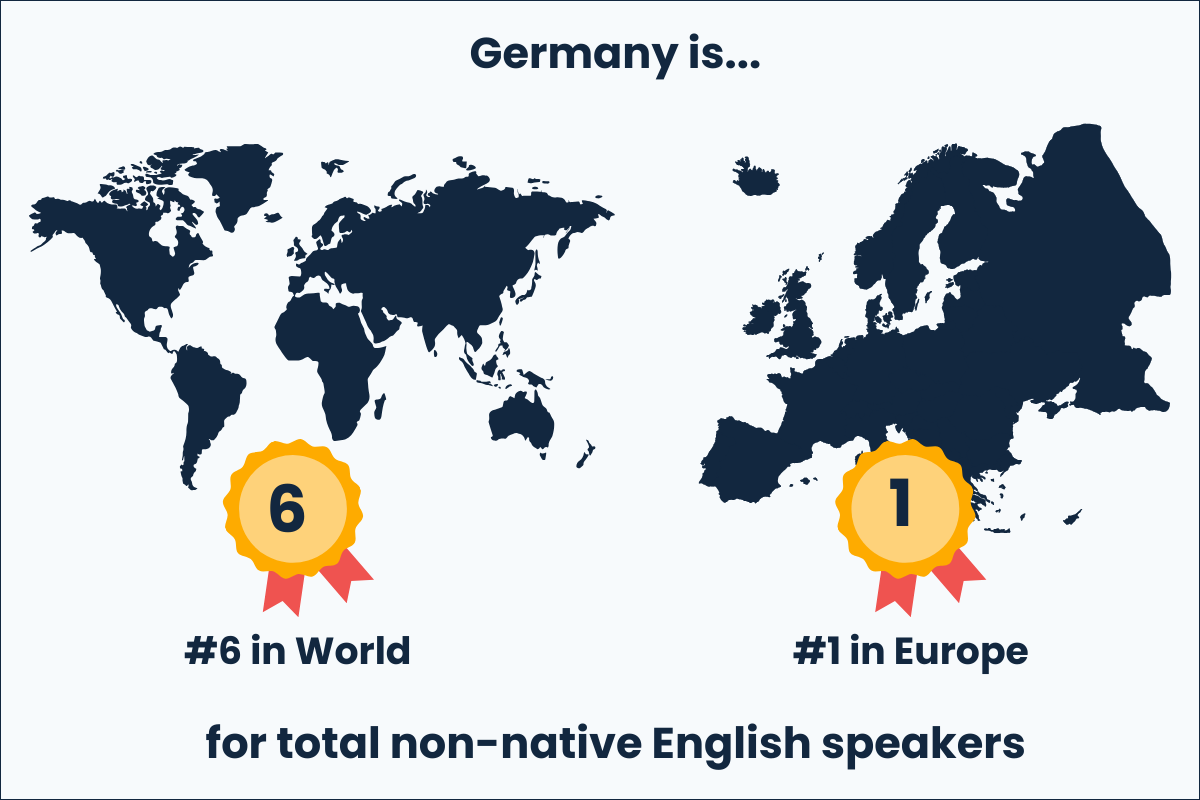
Close to 45.5 million Germans speak English as a second language, according to a Eurobarometer report. These figures make Germany the #1 country in Europe and #6 in the world in terms of total non-native speakers of English.
Below, you’ll find an in-depth breakdown of the German population speaking English in Germany. This article covers the level of English skills among speakers, as well as a demographic and geographic breakdown of English speakers in the entire country.
Keep reading to discover more interesting facts on this topic!
Number of English Speakers in Germany (General Stats)
Nearly 4 in 5 Germans speak a foreign language, and more than 1 in 2 people speak fluent English. Of course, English skills vary depending on country region and age group. But overall, the average German person has a good grasp of the English language and is more than able to hold a conversation at a fluent level.
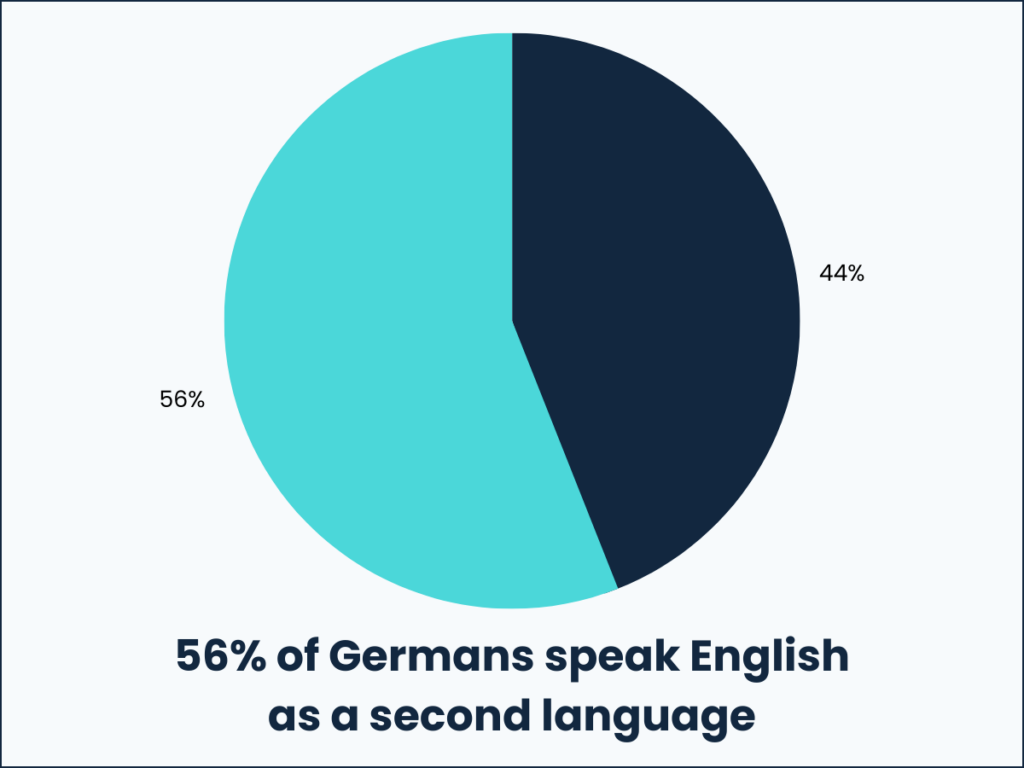
To put things into perspective, here are some quick facts about English speakers in Germany:
- English is spoken as a second language by 45,400,000 people in Germany, or 56% of the German population.
- Germany has the most non-native English speakers in all of Europe.
- The number of native English speakers in Germany in 2020 was 392,000, or 0.47% of the population, according to a census done by the Statistisches Bundesamt.
- The EF English Proficiency Index (EPI) ranks Germans as the 10th best non-native English speakers in the world in the year 2022. This is one spot higher than the previous year.
- According to the same 2022 EPI index, Germany achieved an average EPI score of 613 out of 800, which translates into a very high level of proficiency.
- The average German person speaks English at a C1 level.
- Bavaria is the #1 most English-savvy state in Germany, with an English Proficiency Index (EPI) score of 636 out of 800.
- Karlsruhe is the city with the best English speakers, with an average EPI score of 655.
- German people aged 21-25 had the highest English skill levels.
- According to statistics provided by Statista, 12.31 million Germans rate their English language skills as very good, and double as many Germans rate their skills as fairly good.
- English is a compulsory subject in the German school curriculum, with children starting English classes as soon as age 5.
These figures prove that Germany is among the best countries in the world at speaking English, even though it’s not the primary language in the country.
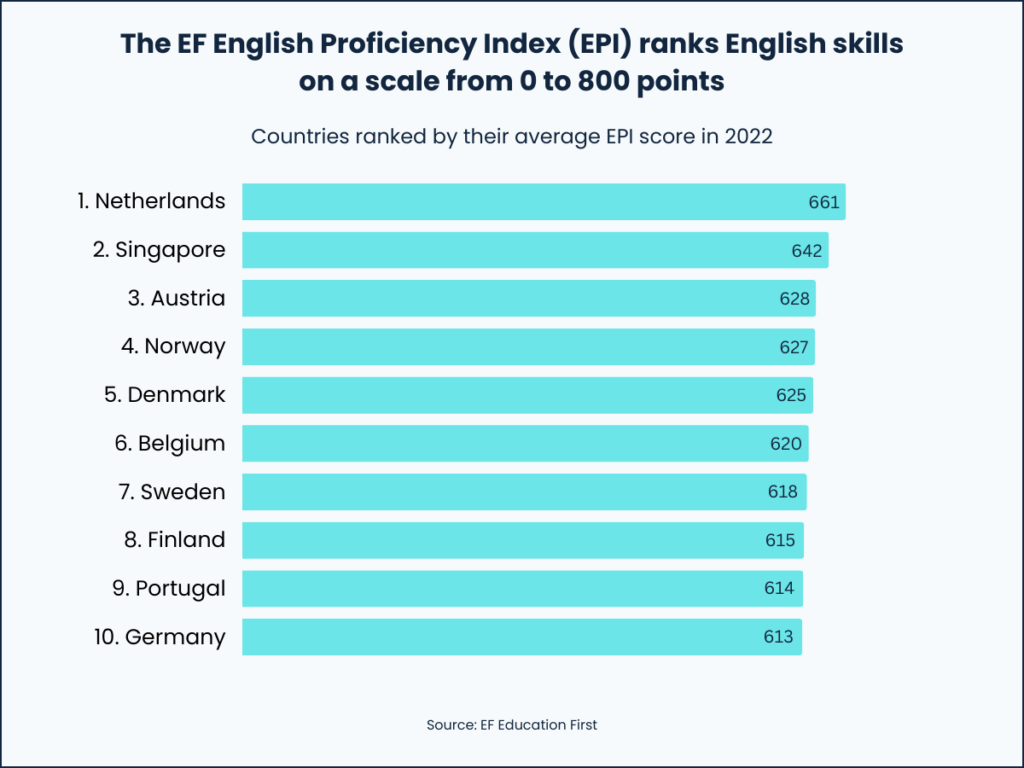
Although Germany comes up in place 10, it’s worth noting the competition for first place is a tight race. With an average EPI score of 613, Germany is not far behind the Netherlands, which has an average score of 661 and enjoys the title of the most proficient nation in the world at speaking English.
Sources: EF English Proficiency Index, Statista, Eurostat, Wikipedia
English Speakers in Germany by Region
Germany is a large country consisting of 16 administrative regions. The latest data from the EF English Proficiency Index website offers English language scores for 14 of these.
The top five German regions with the best English are:
- Bavaria
- Baden-Württemberg
- Bremen
- Thuringia
- North Rhine-Westphalia
Below you can see the average proficiency for each federal state:
| Region | Total Population | Average EPI Score (Out of 800) | Corresponding Proficiency Level | CEFR Equivalent |
| Bavaria | 13.08 million | 636 | Very High | C1 |
| Baden-Württemberg | 11.07 million | 631 | Very High | C1 |
| Bremen | 569,352 | 617 | Very High | C1 |
| Thuringia | 2.143 million | 616 | Very High | C1 |
| North Rhine-Westphalia | 17.93 million | 615 | Very High | C1 |
| Lower Saxony | 7.982 million | 613 | Very High | C1 |
| Schleswig-Holstein | 2.920 million | 613 | Very High | C1 |
| Rhineland-Palatinate | 4.085 million | 613 | Very High | C1 |
| Saxony Anhalt | 2.208 million | 605 | Very High | C1 |
| Saxony | 4.078 million | 600 | Very High | C1 |
| Saarland | 990,509 | 595 | High | B2 |
| Hesse | 6.266 million | 588 | High | B2 |
| Mecklenburg-Vorpommern | 1.61 million | 583 | High | B2 |
| Brandenburg | 2.537 million | 581 | High | B2 |
There isn’t a large difference in English skills among German regions. Both Northern and Southern regions boast very high English skills. The same is true for East Germany and West Germany, where English speakers have very high skills on average.
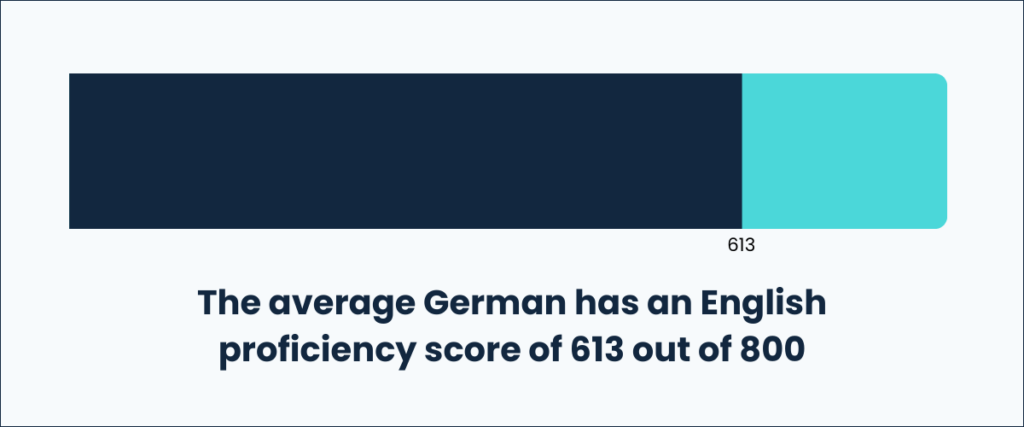
Overall, Bavaria boasts the highest English level in the country, with an EPI score of 636, which is 23 points higher than the national average.
This should come as no surprise. Bavaria is among the largest federal states in Germany, home to the world-renowned University of Munich, the second largest economy at a national level, and a worldwide leader in industrial innovation.
Bavaria is a cultural and technological hub that attracts people from all over the world. Its cities have some of the largest populations of English speakers in the country, including German locals, many immigrants, and English-speaking tourists.
Baden-Württemberg comes in second place with a very high level of English proficiency and a 631 score.
Bremen, Germany’s smallest region, ranked third place in English proficiency, with a score of 617.
Other regions with very high English proficiency and a score closest to the national average include:
- Lower Saxony
- Schleswig-Holstein
- Rhineland-Palatinate
- Saxony Anhalt
- Saxony
On the opposite end of the spectrum, the state of Brandenburg comes in last place with an average EPI score of 581, which is still considered a high level of proficiency.
Saarland, Hesse, and Mecklenburg-Vorpommern are also among the regions with high English proficiency, but with an EPI score below 600.
From the Northernmost state of Schleswig-Holstein down to Baden-Württemberg in the deep south, and from the most to least populous regions in the country, German people are, on average, highly skilled English speakers.
This means that the vast majority of Germans can easily understand written and spoken English, and they can hold a conversation on various topics.
Sources: EF English Proficiency Index
English Speakers in Germany by City
The same 2022 EPI index offers data on 16 German cities.
The five major German cities where people speak the best English are:
- Karlsruhe
- Munich
- Dresden
- Bremen
- Düsseldorf
However, most German cities boast impressive English skills. Here’s what the numbers tell us:
| City | Total Population | Average EPI Score (Out of 800) | Corresponding Proficiency Level | CEFR Equivalent |
| Karlsruhe | 313,092 | 655 | Very High | C1 |
| Munich | 1.472 million | 648 | Very High | C1 |
| Dresden | 554,649 | 642 | Very High | C1 |
| Bremen | 569,352 | 640 | Very High | C1 |
| Düsseldorf | 619,294 | 635 | Very High | C1 |
| Bonn | 327,258 | 633 | Very High | C1 |
| Stuttgart | 634,830 | 631 | Very High | C1 |
| Hamburg | 1.841 million | 630 | Very High | C1 |
| Dortmund | 587,010 | 628 | Very High | C1 |
| Hanover | 532,163 | 628 | Very High | C1 |
| Nuremberg | 518,365 | 626 | Very High | C1 |
| Cologne | 1.086 million | 624 | Very High | C1 |
| Leipzig | 587,857 | 612 | Very High | C1 |
| Essen | 583,109 | 594 | High | B2 |
| Berlin | 3.645 million | 592 | High | B2 |
| Frankfurt | 753,056 | 591 | High | B2 |
Oddly enough, the capital city of Berlin didn’t even make it in the top 10, despite having the largest population of English speakers in the country.
Statistically, Karlsruhe is the city with the best English speakers in Germany.
The 22nd largest city in Germany, Karlsruhe is located in the southern region of Baden-Württemberg. While not as populous as other German cities, Karlsruhe offers an exciting combination of history, eclectic architecture, and a high-tech local industry.
Munich is the second-best city in terms of English speakers. Munich is the third largest city in the country and home to a sizable number of English speakers. This tourist destination is best known for its annual Oktoberfest celebration, and, of course, its beer.
Other German cities with very high English skills and an EPI score above the national average include:
- Bonn
- Stuttgart
- Hamburg
- Dortmund
- Hanover
- Nuremberg
- Cologne
Berlin came in second to last. The average Berlin inhabitant is likely to be highly proficient in English, being able to speak fluently on a variety of topics, including abstract and technical ones.
Although Berlin is near the bottom of the list, it’s worth noting that it’s the most populated city in the country and home to one of the largest communities of English speakers. Given its very large population, the city is bound to have English speakers of all levels.
Frankfurt ranked last place with an average EPI score just shy of 600. This means the average person in Frankfurt is likely to have high to very high English proficiency.
Frankfurt is the most important financial hub in Europe, being home to the European Central Bank and the Frankfurt Stock Exchange. English is an integral part of Frankfurt’s professional world. In fact, Frankfurt is among the cities with the most English-speaking job ads, which amount to 11% of the total job offers on the market.
Large metropolitan areas in Germany rank very high in terms of English skills. The five biggest cities in the country, Berlin, Hamburg, Munich, Cologne, and Frankfurt all boast either high or very high proficiency levels and a sizeable population of English speakers.
Here are the biggest German cities ranked by size, together with their average English level:
| Ranking by Size | German City | English Proficiency |
| #1 (3.645 million) | Berlin | High |
| #2 (1.841 million) | Hamburg | Very High |
| #3 (1.472 million) | Munich | Very High |
| #4 (1.086 million) | Cologne | Very High |
| #5 (753,056) | Frankfurt | High |
| #6 (634,830) | Stuttgart | Very High |
| #7 (619,294) | Düsseldorf | Very High |
| #8 (587,857) | Leipzig | Very High |
| #9 (587,010) | Dortmund | Very High |
| #10 (583,109) | Essen | High |
Sources: EF English Proficiency Index
English Speakers in Germany by Demographic Group
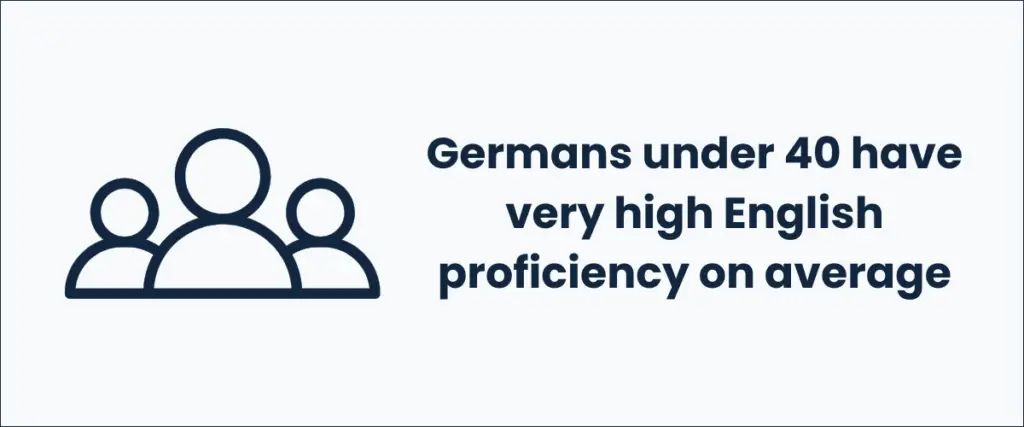
There’s not a huge gap in English skills among different demographic groups in Germany. Overall, the average German citizen speaks very good English irrespective of age or gender. However, some groups ranked marginally higher. Here are some more in-depth stats:
- Overall, men scored 10 points higher than women on the English proficiency index.
- Both German men and women speak English at a C1 level.
- The best English speakers in Germany fall within the age bracket of 21-25 years old.
- The average young college graduate is likely to be very skilled in English.
- People aged 26-30 years old ranked second best in terms of English skills.
- Overall, Germans under 40 have very high English proficiency.
- People older than 40 had, on average, a B2 English level, which denotes a very good grasp of the English language.
- People under 20 are slightly less proficient than other age brackets under 40.
While there is no data on people aged 55 and over, it’s likely that older adults don’t speak English as well. According to Prof. Dr. Daniela Elsner, English did not become a mandatory subject in the German school curriculum until 1964.
This means the average German over the age of 55 might not have an equally good command of the English language, compared to the younger generations.
Similarly, people under the age of 18 were not included in the EF-EPI data. However, young high school students and high school graduates in Germany are likely to have an intermediate English level and a reasonable degree of fluency.
According to the school curriculum, German pupils are expected to reach an A1 English level by the end of primary school in grade 4. English classes continue throughout grades 5-10.
As per the CEFR standard, students should speak English at a high B1 level by the end of 9th grade. Many German parents also enrol their children for additional language classes.
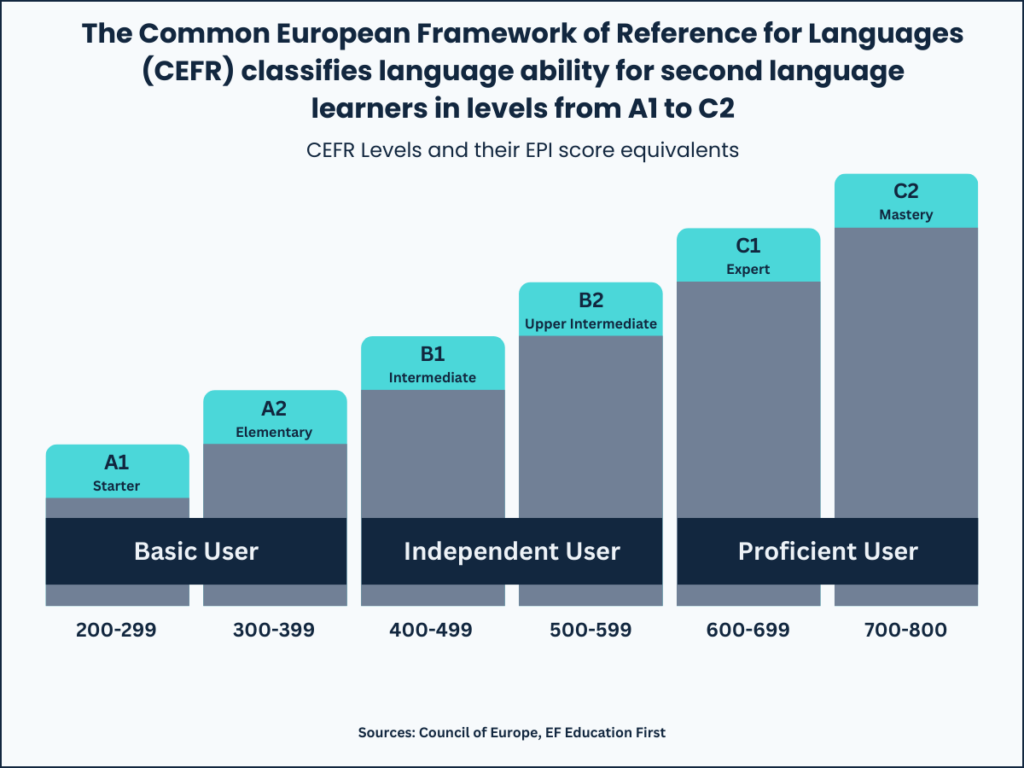
Sources: EF English Proficiency Index, Springer, Europa-Universität Flensburg, BBIS
Conclusion
Germany enjoys a high standard of education, and English language classes are an important part of the curriculum in most schools throughout the country.
In addition, the English language is crucial in the professional world thanks to Germany’s international impact in the financial and technological sectors.
As a result, 56% of Germany speaks English, with the average German having an advanced level and high proficiency. The best English speakers in Germany are people younger than 40, especially those living in large metropolitan areas like Munich, Hamburg, or Berlin.
FAQs
Is It Impolite to Use English in Germany?
Speaking English in Germany is not impolite. However, it’s considered good etiquette to first introduce yourself in German.
Learning a few basic phrases shows that you respect the local culture. A polite “Entschuldigung, sprechen Sie Englisch?” goes a long way.
Can You Get Around in Germany Without Speaking German?
English is very common in large cities, especially around central and tourist areas. Workers in the hospitality industry speak English, so you shouldn’t encounter issues in hotels, restaurants, or bars if you don’t speak German.
Navigating public transportation, local grocery stores, and other general services will be a bit difficult if you don’t learn German. But you can still get by with the help of a dictionary, even without learning German.
Subtitles vs Dubbing – Which Is More Common in Germany?
The preferred translation method in Germany is dubbing. Most movies on TV and in cinemas are dubbed in German.
However, in recent years, many theatres have started distributing movies with subtitles. These are usually described as “OmU” (Original mit Untertiteln), and they’re most attractive to younger people.
Is English Widely Spoken in The German Workplace?
Yes! English skills are an asset for most Germans working in hospitality, tech, or finance, with many job offers listing spoken English as a requirement.
Additionally, close to 15% of all job offers in large German cities are for English-only jobs.